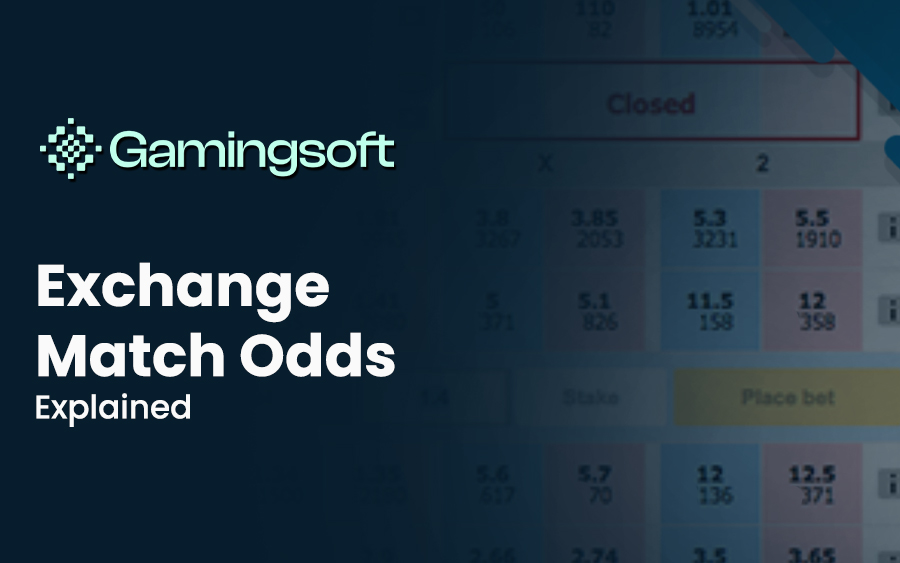In the fast-paced world of sports betting, understanding exchange match odds is crucial for both bettors and operators. Betting exchanges have redefined the iGaming landscape by allowing users to act as both bettors and bookmakers, creating a dynamic marketplace for odds and liquidity. For operators looking to expand into sports betting exchanges, understanding how match odds work is the foundation for delivering transparency, engagement, and profitability.
In this article, we’ll break down what exchange match odds are, how they work, their impact on player behavior, and why iGaming operators should consider integrating this model.

What Are Exchange Match Odds?
On a betting exchange, odds aren’t set by a bookmaker. Instead, they are determined by the marketplace of bettors who “back” or “lay” an outcome.
- Back Bet (For an outcome): A bettor wagers that an event will happen (e.g., Manchester United to win).
- Lay Bet (Against an outcome): A bettor wagers that an event will not happen (e.g., Manchester United will not win).
Exchange match odds are the prices (odds) generated by this supply-and-demand model. The odds reflect the market’s collective judgment, often offering better value than traditional sportsbooks.
Example:
- A sportsbook might offer odds of 2.0 (evens) on a team to win.
- On an exchange, because other bettors are offering competing odds, you might see 2.1 or even 2.2—giving bettors slightly better returns.
How Do Exchange Match Odds Work?
Unlike traditional betting where the bookmaker builds in a margin (the “overround”), betting exchanges work on peer-to-peer matching.
- The user places a back bet (e.g., $100 on Team A to win at odds of 2.2).
- Another user places a lay bet (e.g., willing to risk $120 against Team A winning at odds of 2.2).
- Once matched, the market locks in these odds. The exchange takes a small commission (usually 2–5%) on net winnings.
This system ensures fairness and transparency because the odds are market-driven, not set by a single centralized entity.
Why Players Love Exchange Match Odds
- Better Value – Players often get higher odds than bookmakers.
- Transparency – Odds are generated by the market, not hidden margins.
- Flexibility – Players can switch roles: back one outcome, lay another.
- Trading Opportunities – Bettors can trade positions before or during live events, like financial markets.
A 2024 survey found that 68% of sports bettors prefer betting exchanges when available, citing higher odds and more control as the main reasons.
Why Operators Should Care About Exchange Match Odds
For iGaming operators, offering exchange-based betting is not just about attracting sharp bettors—it’s about capturing a new segment of the market.
- Player Retention: Transparency builds long-term trust.
- Revenue Streams: Instead of relying on margins, operators profit through commissions.
- Market Differentiation: Few operators run exchanges compared to sportsbooks, giving new entrants a competitive edge.
- Engaged High-Value Players: Exchanges attract sophisticated bettors who bet frequently and in larger amounts.
Exchange Match Odds vs Bookmaker Odds
| Feature | Betting Exchange | Traditional Bookmaker |
| Odds Source | Market-driven (peer-to-peer) | Bookmaker sets odds |
| Profit Model | Commission on winnings | Built-in margin (overround) |
| Player Roles | Can back and lay bets | Can only back bets |
| Odds Value | Typically higher | Slightly lower |
| Transparency | Full visibility of odds & liquidity | Limited, controlled by bookmaker |
Example: How Exchange Match Odds Play Out
Imagine a football match: Liverpool vs Chelsea.
- On a sportsbook: Liverpool odds = 2.0
- On an exchange: Players back Liverpool at 2.1, lay at 2.12
If a bettor stakes $100 on Liverpool to win at 2.1 odds:
- If Liverpool wins → Profit = $110 (vs $100 at sportsbook).
- If Liverpool loses → Full stake lost.
Meanwhile, the exchange operator earns commission (e.g., 5% of winnings = $5.50).
This win-win structure makes exchange odds both player-friendly and operator-profitable.
The Challenges of Exchange Match Odds
While attractive, betting exchanges also pose challenges for operators:
- Liquidity Needs: Exchanges thrive on large active user bases.
- Sophisticated Players: May scare away casual bettors who prefer simpler bookmaker odds.
- Regulatory Complexity: Exchanges face stricter oversight in some markets.
But with the right integration partner, these challenges can be managed effectively.
Conclusion
Exchange match odds represent the next step in the evolution of sports betting. They offer players transparency, better value, and more control—while giving operators a sustainable commission-based revenue model.
For iGaming brands looking to stand out in a competitive market, adopting exchange odds could be the game-changer.
Ready to bring exchange betting to your platform? Visit www.gamingsoft.com or contact [email protected] today.
About Gamingsoft
Gamingsoft is a leading provider of online casino solutions, offering a comprehensive suite of services, including a white-label solution, API integration, payment solutions, game development, and more, to iGaming operators worldwide. With over years of experience, Gamingsoft has earned a reputation for delivering innovative and reliable solutions, helping clients succeed in the competitive iGaming industry.





